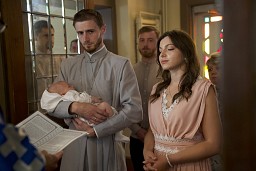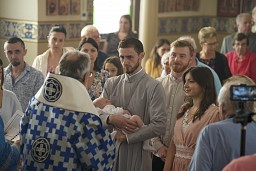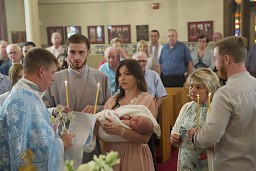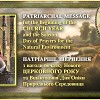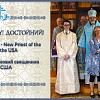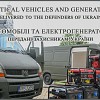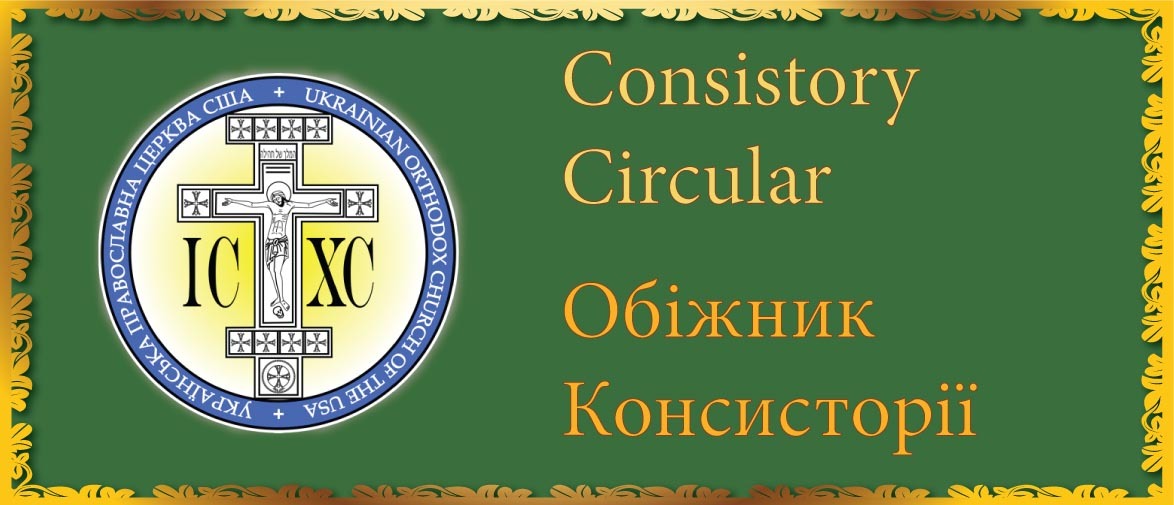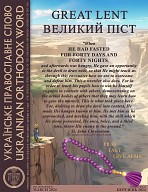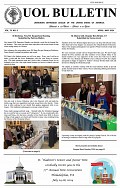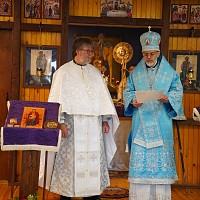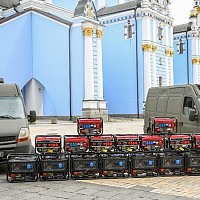On Monday 28thAugust, the Feast of the Dormition of the Most Holy Mother of God, Archbishop Daniel of the Western Eparchy of the UOC of the USA celebrated the Divine Liturgy at the Assumption of the Birth-Giver of God Ukrainian Orthodox parish in Northampton, PA.
The day was truly filled with joy of the feast, but also with the celebration of the Holy Mystery of Baptism of the child of God David Kravchenko, a son of Fr. Oleg and Dobrodiyka Olha Kravchenko, who prayerfully serve the spiritual needs of the parish community.
Visiting clergy, vested in blue lined the middle aisle of the church, awaiting the commencement of the celebration were: Very Rev. Fr. Orest Poukhalsky – Sts. Peter and Paul UOC - Millville, NJ; Very Rev. Fr. Vasyl Pasakas - St. Sophia Seminary in South Bound Brook, NJ; Rev. Fr. Nikolai Breckenridge – St. Nicholas OCA – Bethlehem, PA; Rev. Fr. Vasyl Dovgan - St. Nicholas UOC - Troy, NY; Rev. Fr. Sviatoslav Hot - Holy Ascension UOC - Maplewood, NJ; Rev. Fr. Richard Jendras – Protection of the Mother of God Cathedral - Allentown, PA; Deacon Pavlo Vysotskyi - St. Sophia Seminary - South Bound Brook, NJ and Deacon Serhii Khomitskyi – Sts Peter and Paul UOC - West Islip, NY.
During the sermon of the festive Divine Liturgy Archbishop Daniel shared with everyone in attendance the narrative about the earthly life of the Birth-Giver of God, stating: “ Today we celebrate the great feast of the Dormition and bodily Assumption of the Mother of God, often referred to as the summer Pascha. We see in the Gospel according to John that, after the Lord’s crucifixion, the beloved disciple of Christ, John, “took [the Blessed Virgin] into his own house” (John 19:27).
The story of the Dormition, then, begins in the house of St John the Apostle in Jerusalem. When our Lady had reached the end of her earthly life, the Archangel Gabriel came to her and announced to her that, “In three days’ time the Lord will take you”. At the same time, the Holy Spirit brought all but one of the Apostles — who were then spread throughout the world on their missionary journeys, in Europe, Africa, and Asia — to Jerusalem. Only the Apostle Thomas, who was then in India, was not present. This is why the festal icon shows the apostles surrounding the Virgin’s bed.
In the same icon, we also see the Lord, who holds in his arms a small child, symbolizing the soul of his Mother. As you know, when a person dies, their soul is accompanied by angels as it journeys to its resting place. However, no angel could possibly accompany her who is more honorable than the Cherubim and incomparably more glorious than the Seraphim! The blessed Virgin, by giving birth to God the Word, had become the Birth-giver and Mother of God, and is higher than every angel, and every other created being. For this reason, only the Lord himself was in a position to accompany her soul to Paradise. After her bodily death — that is, the separation of her soul from her body — the Virgin’s body was placed in a tomb which still survives in Jerusalem as a site of Orthodox pilgrimage. After three days, the Apostle Thomas also arrived in Jerusalem, and all twelve Apostles went together to the grave in order for Thomas to bid farewell to the blessed Mother of God. But the tomb was empty. Empty because the body of the Virgin had risen — it was reunited to her body — and assumed into the heavens.
This is what the sacred tradition of the Orthodox Church of Christ teaches us. It goes without says that we won’t find any of these details in the Sacred Scripture, since these events took place long after the events described in the four Gospels and the other books of the New Testament. One could be forgiven for asking, however, why the Church, on this great feast of the Mother of God, chose a Gospel reading that not only has no immediate connection to the Dormition, but a Gospel reading in which the Virgin doesn’t feature at all. The Mary mentioned in the Gospel reading we just heard is not the Virgin, but the sister of Martha. The same Gospel passage is read on other feasts of the Mother of God. Why, then, do we read this particular passage, which at first sight might seem irrelevant? Of course, in the second part of the reading, which comes from a different chapter of the Gospel, we see a woman shouting, “blessed is the womb that bore Thee and the breasts which Thou didst suck”, but also here, the Lord doesn’t reply with reference to his Mother, but simply makes general reference to those who hear and keep the word of God.
Why didn’t the Church choose a passage that is directly related to the Virgin for today’s Divine Liturgy? I would say that the Church here wishes to emphasize the Virgin’s humanity. What do I mean by this? I mean that, all the various things we say to honor the blessed Virgin, we don’t say these simply because she’s the Mother of God — God didn’t just choose some girl, and then we honor that girl because of his choice. Quite the contrary, God chose her precisely because the blessed Virgin had the virtues and spiritual abilities that were needed in order for her to become the Mother of God. The blessed Virgin, more than any other human being in the world, had understood that “one thing is needful”, and the blessed Virgin “Mary chose this good part” (Luke 10:42). In other words, today’s Gospel, despite the fact that it makes no direct reference to our Lady, describes the virtues by which she became Mother of God. Therefore, when the woman cries out — “blessed is the womb that bore thee, and the breasts which thou didst suck” — the Lord’s answer — “blessed are those who hear the word of God and keep it” — does not mean that whoever hears the word of God is equal to his Mother. In no way! He means that our Lady, more than all others, was the one who heard the word of God, and by keeping this word in her heart, she became able to bear the pre-eternal Word of God in her womb. In other words, our Lady, as a human being, as a member of the human race, acquired the virtues, the faith, the humility, the love, avoided every sinful action, and became worthy of the indescribable work she was tasked with.
Today, we are not simply celebrating some event in the life of the Virgin Mary, but we also celebrate our own salvation. When Christ rose from the dead, he opened the door of resurrection to all mankind, to every human person. And with the resurrection of our Lady, we have a proof of the truth of this promise. If our Lady was conceived and was born without the consequences of the ancestral sin, and was assumed alive into the heavens without tasting bodily death, those events would certainly constitute great miracles worthy of celebration, but it would have no relevance for us.
Both today’s Gospel reading and the fact that, despite believing in her Assumption, we focus today on her Dormition, shows us that Theotokos, who now is higher than all of God’s creations, is not outside humanity, but belongs to our human race. Her resurrection is a proof of the general resurrection and the eternal life which awaits us all, and for this reason we can without exaggeration refer to it as the summer Pascha.
Today, we all celebrate, all of humanity keeps festival. Let us ask the Mother of God to guide us with her example, to cover us with her love, and to pray unceasingly to her Son, so that our future resurrection will be a resurrection unto life and not unto judgment. Amen.”
After the service Vladyka greeted the congregation with the great feast of the Dormition of the Mother of God, and blessed the flowers that were brought into the temple by the congregation in attendance.
The faithful approached the Shroud of the Mother of God, which was put in the middle of the Memorial Church for the veneration.
Following the celebration of the Divine Liturgy, the sacred moments of the Holy Mysteries of Baptism and Chrismation took place.
Baptism is our death, burial, and resurrection in union with our Lord and God and Savior Jesus Christ. It replaces circumcision as the new rite of passage into the Covenant between God and His people. It is through Baptism that we enter into the Kingdom of God and into eternal life. The Apostle Paul described the promise of God beautifully in his letter to the Romans: “Therefore we were buried with Him through baptism into death, that just as Christ was raised from the dead by the glory of the Father, even so we also should walk in newness of life”. Thus we can see the essential quality of baptism in attaining salvation.
To baptize (Gr. baptizo) literally means to immerse or to put into. Therefore, the Orthodox have always baptized by triple immersion, “in the name of the Father, and of the Son, and of the Holy Spirit”. In the Old Testament (OT), we see a type of Christian Baptism in the passage across the Red Sea. John the Baptist, the last prophet of the Old Covenant, baptized with water unto repentance and Our Lord Jesus Christ received this baptism and transformed it.
What happens to us as a result of Baptism?
There are three main things that occur or and are set in motion upon our being baptized. All three are spiritual in nature and reflect the “walk in newness of life” we are about to experience.
#1. A first and second dying
During Holy Baptism, we die with Christ on the Cross and descend into Hades with Him (the immersion). Then we ascend out of Hades with Christ, renewed and born again. As Saint Cyril of Alexandria (4th century) wrote to new converts, “You were led by the hand to the holy pool of divine baptism […] and each of you was asked if he believed in the Name of the Father, and of the Son, and of the Holy Ghost. And you made that saving confession, you descended into the water and came up again three times. In the very same moment, you died and were born.”
The second dying we experience is our continual death to sin. Every day we must die to sin; when we don’t and allow ourselves to sin, we have quite literally forsaken/rejected our baptism. Saint Paul writes to the Colossians: “Therefore put to death your members which are upon the earth: fornication, uncleanness, passion, evil desire, and covetousness, which is idolatry”.
#2. The resurrection of righteousness
Baptism ushers in our new life in Christ, our new birth and the entrance into God’s Kingdom where we walk in newness of life. This Mystery joins us to Christ in His glorified humanity and indwelt by God Himself . Because of Christ’s death, we can now have a true relationship with God. A real, dynamic relationship, a true life in Christ. This first resurrection also serves as the prelude to the resurrection of our bodies at the Second Coming.
#3. Intimate, continual communion with God
The final spiritual change that Baptism accomplishes within us is purpose. We rise up out of Baptism to a new life, to the beginning of eternal life itself. This is why Saint Peter tells us that Baptism saves us – it removes filth from our souls and bodies and gives us a “good conscience toward God”. Because Christ took on our human nature and deified it by placing it at the Right Hand of the Father, we now have a pathway toward complete communion with God. We can participate in the Life of His Church and partake of Him in the Eucharist. We can experience His love, His grace, His energies, in a very real way. And we can continue to progress toward eternal life with God right there beside us.
Holy Baptism initiates a very real transformation in the mind, heart, soul, and body. We die with Christ on the Cross and resurrect with Him to a new life in which we die to sin. And because of this rebirth, we can now attain full communion with God, a real relationship with Him, as we work toward our salvation. Therefore, we should thank God for giving us this incredibly beautiful, heartrending gift, unworthy as we are.
The day concluded with a joyful luncheon in the parish social hall, treating everyone in attendance to a variety of delicious Ukrainian dishes, thus sharing the joy of the day with the larger Orthodox community in Northampton, PA.
|
| |||||||||||||



